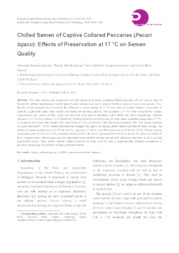Chilled semen of captive collared peccaries (Pecari tajacu): effects of preservation at 17 °C on semen quality.
Chilled semen of captive collared peccaries (Pecari tajacu): effects of preservation at 17 °C on semen quality.
Autoria: GARCIA, A. R.; KAHWAGE, P. R.; GUIMARÃES, D. A. de A.; OSHASHI, O. M.
Resumo: The trade creation and conservation of wild species in Amazon, including collared peccaries (Pecari tajacu), may be favored by artificial insemination, but the time of semen storage may lead to reduced fertility in sperm of some wild animals. Thus, the aim of this research was to evaluate the influence of semen storage at 17 °C over time on seminal features of peccaries in captivity. Eight adult males were sedated and underwent electroejaculation. The ejaculates (n = 65) were evaluated for volume, concentration, pH, sperm motility, vigor, and cell with intact plasma membrane intact (IPM) and sperm morphology. Selected ejaculates (n = 21) were diluted (1:1) in Beltsville Thawing Solution and kept during 48 hours under controlled temperature (17 °C). Assessments were made after dilution (T0), after 24 hours (T24), and 48 hours after the onset of cooling (T48). The storage impacted on sperm survival (P < 0.05). Semen characteristics changed throughout the storage period studied and after 48 hours storage. The decline of sperm motility was of 55.2% for 10.9%, vigor was 2.3 for 0.5 and IPM cells were of 59.0% for 15.8%. Primary defects sperm increased of 19.8% for 32.2%, secondary defects of 9.8% for 10.4% and total defects of 29.4% for 42.7%. However, within 24 hours of preservation, chilled semen peccaries presented sperm motility average rate and IMP cells levels indicative to use in assisted reproductive events. These results indicate chilled semen for 24 hours could be used in experimentally artificial insemination of peccaries, technology that still has not been performed before.
Ano de publicação: 2012
Tipo de publicação: Artigo de periódico
Unidade: Embrapa Pecuária Sudeste
Palavras-chave: Amazon, Collared peccary, Semen conservation, Sperm, wildlife
Observações
1 - Por padrão são exibidas publicações dos últimos 20 anos. Para encontrar publicações mais antigas, configure o filtro ano de publicação, colocando o ano a partir do qual você deseja encontrar publicações. O filtro está na coluna da esquerda na busca acima.
2 - Para ler algumas publicações da Embrapa (apenas as que estão em formato ePub), é necessário ter, no celular ou computador, um desses softwares gratuitos. Sistemas Android: Google Play Livros; IOS: iBooks; Windows e Linux: software Calibre.
Acesse outras publicações
Acesse a Base de Dados da Pesquisa Agropecuária (BDPA) para consultar o acervo completo das bibliotecas da Embrapa.

